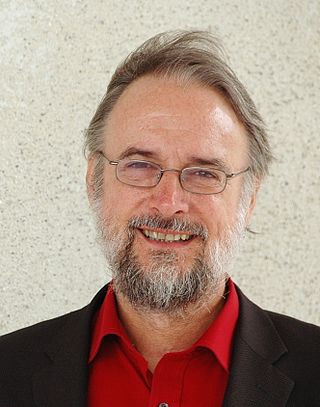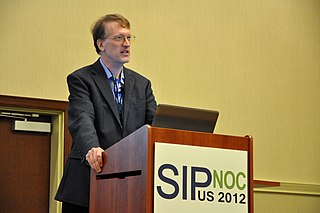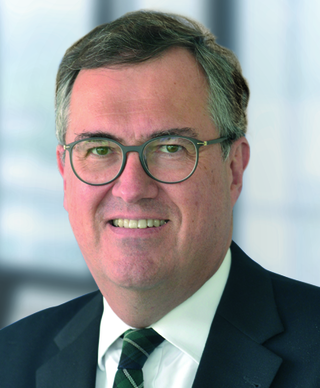Related Research Articles

MP3 is a coding format for digital audio developed largely by the Fraunhofer Society in Germany under the lead of Karlheinz Brandenburg, with support from other digital scientists in other countries. Originally defined as the third audio format of the MPEG-1 standard, it was retained and further extended—defining additional bit rates and support for more audio channels—as the third audio format of the subsequent MPEG-2 standard. A third version, known as MPEG-2.5—extended to better support lower bit rates—is commonly implemented but is not a recognized standard.

Karlheinz Brandenburg is a German electrical engineer and mathematician. Together with Ernst Eberlein, Heinz Gerhäuser, Bernhard Grill, Jürgen Herre and Harald Popp, he developed the widespread MP3 method for audio data compression. He is also known for his elementary work in the field of audio coding, the perception measurement, the wave field synthesis and psychoacoustics. Brandenburg has received numerous national and international research awards, prizes and honors for his work. Since 2000 he has been a professor of electronic media technology at the Technical University Ilmenau. Brandenburg was significantly involved in the founding of the Fraunhofer Institute for Digital Media Technology (IDMT) and currently serves as its director.

Robert Gray Gallager is an American electrical engineer known for his work on information theory and communications networks.

Thomas Shi-Tao Huang was a Chinese-born American computer scientist, electrical engineer, and writer. He was a researcher and professor emeritus at the University of Illinois at Urbana-Champaign (UIUC). Huang was one of the leading figures in computer vision, pattern recognition and human computer interaction.

Thomas Wiegand is a German electrical engineer who substantially contributed to the creation of the H.264/AVC, H.265/HEVC, and H.266/VVC video coding standards. For H.264/AVC, Wiegand was one of the chairmen of the Joint Video Team (JVT) standardization committee that created the standard and was the chief editor of the standard itself. He was also a very active technical contributor to the H.264/AVC, H.265/HEVC, and H.266/VVC video coding standards. Wiegand also holds a chairmanship position in the ITU-T VCEG of ITU-T Study Group 16 and previously in ISO/IEC MPEG standardization organizations. In July 2006, video coding work of the ITU-T was jointly led by Gary J. Sullivan and Wiegand for the preceding six years. It was voted as the most influential area of the standardization work of the CCITT and ITU-T in their 50-year history. Since 2018, Wiegand has served as chair of the ITU/WHO Focus Group on Artificial Intelligence for Health (FG-AI4H). Since 2014, Thomson Reuters named Wiegand in their list of “The World’s Most Influential Scientific Minds” as one of the most cited researchers in his field.
Gary Joseph Sullivan is an American electrical engineer who led the development of the AVC, HEVC, and VVC video coding standards and created the DirectX Video Acceleration (DXVA) API/DDI video decoding feature of the Microsoft Windows operating system. He is currently Director of Video Research and Standards at Dolby Laboratories and is the chair of ISO/IEC JTC 1/SC 29 and of the ITU-T Video Coding Experts Group (VCEG).

Michael George Luby is a mathematician and computer scientist, CEO of BitRipple, senior research scientist at the International Computer Science Institute (ICSI), former VP Technology at Qualcomm, co-founder and former chief technology officer of Digital Fountain. In coding theory he is known for leading the invention of the Tornado codes and the LT codes. In cryptography he is known for his contributions showing that any one-way function can be used as the basis for private cryptography, and for his analysis, in collaboration with Charles Rackoff, of the Feistel cipher construction. His distributed algorithm to find a maximal independent set in a computer network has also been influential.

Henning Schulzrinne is a German-American computer engineer who led research and development of the voice over IP network protocols.
Knut Blind is a German economist. He is active in the fields of innovation economics focusing on regulation and standardization.
Erdal Arıkan is a Turkish professor in Electrical and Electronics Engineering Department at Bilkent University, Ankara, Turkey. He is known for his invention of polar codes, which is a key component of 5G technologies.
Bhaskar Ramamurthi is an Indian academic who served as the director of Indian Institute of Technology Madras from 2011 to 2022. He succeeded M. S. Ananth and was succeeded by Prof. Kamakoti Veezhinathan.

The Fraunhofer Institute for Telecommunications, Heinrich Hertz Institute, HHI, also known as Fraunhofer HHI or Fraunhofer Heinrich Hertz Institute, is an organization of the Fraunhofer Society based in Berlin. The institute engages in applied research and development in the fields of physics, electrical engineering and computer sciences.
Reimund Gerhard is a German applied physicist and university professor. Between 1979 and 2006 he used the last name "Gerhard-Multhaupt".
Klaus-Robert Müller is a German computer scientist and physicist, most noted for his work in machine learning and brain–computer interfaces.
Paul Juan Tasker is an electrical engineer known for his research on microwaves. He is a professor at Cardiff University, Wales, and a Fellow of the Institute of Electrical and Electronics Engineers.
Lajos Hanzo FREng is an electronics engineer, Professor, and Chair of Telecommunications at the University of Southampton, and also a former Editor-in-Chief of IEEE Press.
Versatile Video Coding (VVC), also known as H.266, ISO/IEC 23090-3, and MPEG-I Part 3, is a video compression standard finalized on 6 July 2020, by the Joint Video Experts Team (JVET) of the VCEG working group of ITU-T Study Group 16 and the MPEG working group of ISO/IEC JTC 1/SC 29. It is the successor to High Efficiency Video Coding. It was developed with two primary goals – improved compression performance and support for a very broad range of applications.

Johann Wolfgang Koch is a German physicist and computer scientist. He teaches applied computer science at the University of Bonn, Germany, and is chief scientist of the Fraunhofer Institute for Communication, Information Processing and Ergonomics. In 2011, Koch was elected a IEEE Fellow and since 2015, he has been an IEEE Distinguished Lecturer
Giuseppe Caire is an Italian telecommunications engineer.
Marvin Victor Zelkowitz is an American computer scientist and engineer.
References
- ↑ "IEEE Fellows 2015". IEEE Communications Society. Retrieved 5 January 2020.
- ↑ "Dr. Detlev Marpe". Fraunhofer Institute for Telecommunications. Retrieved 5 January 2020.